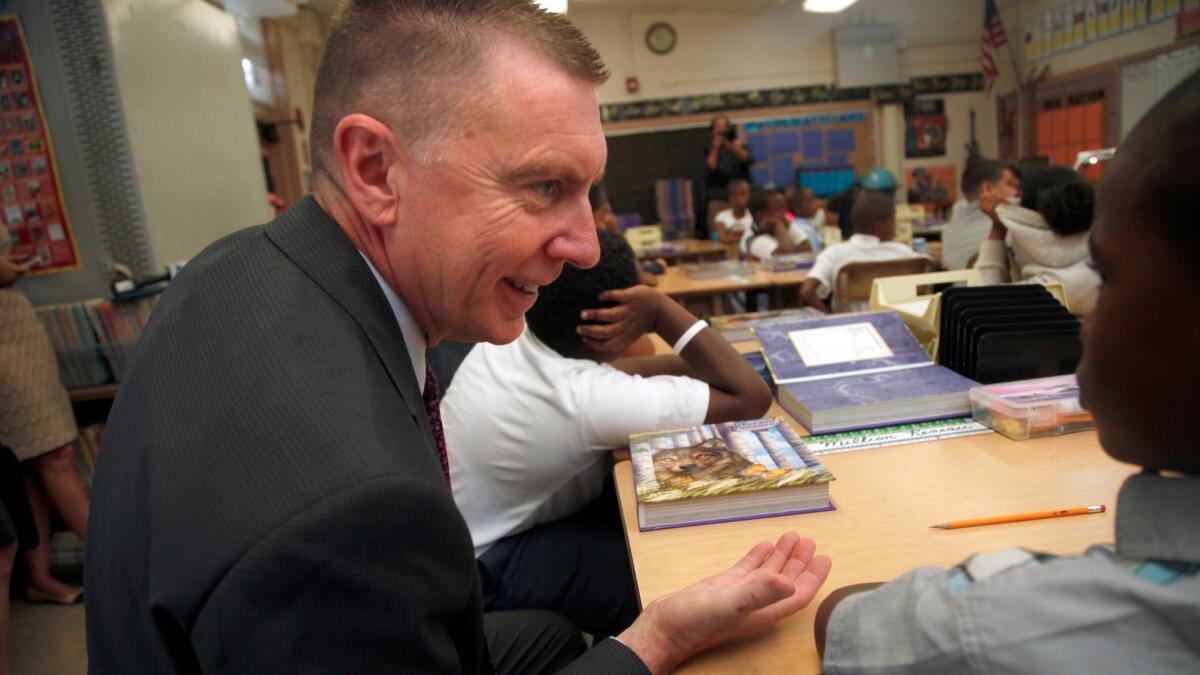Ex-schools chief Deasy’s next step: build alternative juvenile prisons

John Deasy, the controversial former superintendent who led the Los Angeles Unified School District for three-and-a-half turbulent years, is embarking on a new venture that could prove just as challenging: keeping juvenile offenders from returning to jail.
Deasy wants to do that by opening alternative juvenile prisons in Los Angeles and Alameda counties that could include activities such as yoga, meditation, art, counseling, athletics and education. His goal is to reduce recidivism by 50%.
The vehicle, he said, will be a new nonprofit he is creating called New Day, New Year. He plans to begin working on the project full-time in October. He is “just beginning to think through” the details and is working to line up funding, he said.
The plight of incarcerated youth has long been a concern of Deasy’s. He said he began thinking about it as an educator when he saw students leave to serve time.
“As a superintendent, I became more acutely aware of it,” he said Wednesday in an interview.
The U.S. has the highest percentage of incarcerated youth, he said, and “we have created sets of conditions and rules which facilitate that incarceration, such as minimum sentencing and ... the very very specific targeting of some forms of drug use versus others.”
As superintendent, Deasy worked with school police to end citations for minor offenses and, with the backing of the Board of Education, banned defiance as grounds for suspension. The suspension rate decreased sharply, but some teachers have said they’ve struggled to balance the new policies with the need to manage their classrooms and prevent disruption. Deasy declined to comment on the current state of L.A. Unified.
Deasy’s efforts come as several groups are moving to create alternatives to L.A. County’s long-troubled juvenile jails. In March, a county-commissioned report found Central Juvenile Hall to be a “Third World country prison” where “no one cares.” The scathing report came after the county’s Probation Department emerged from oversight from the U.S. Department of Justice for mistreating young people.
Carol Chodroff, an attorney who serves on the county’s working group for Probation Department oversight, is part of the effort to remodel Camp Kilpatrick, a juvenile detention facility in Malibu. She said the remodeled facility will rethink every detail, from training and hiring staff to how children are addressed in an effort to create a positive culture.
Chodroff said she was encouraged by Deasy’s desire to help, but cautioned that collaboration is key. “I’m happy about the idea of an alternative to juvenile incarceration but it really has to be guided by people knowledgeable with how the system works and best practices,” she said. “It’s important that it’s not just a takeover, thinking ‘I can do this better,’ but ultimately recreating a punitive model.”
Alex Johnson, who heads the California Children’s Defense Fund and serves as vice president of the L.A. County Board of Education, said he was looking forward to working with Deasy, because “it is necessary to have all hands on deck.”
While leading the L.A. district, Deasy said he visited incarcerated students several times a month and gave them all a similar speech about “what to do when you get out, how to talk when you get out, how to navigate the system to get back into school.”
“I’ve made some pretty significant contributions in education and really want to switch in the next eight to 10 years to try to really do the same for a set of young people who are forgotten,” he said.
As superintendent, Deasy was known for his focus on data and his emphasis on more stringent teacher evaluations that included students’ scores on tests. He gained national prominence as a leader pushing reforms championed by a group of influential philanthropists and the Obama administration. In L.A., a program he launched to provide each student with an iPad went awry and became the subject of several investigations.
For this and other reasons, a majority of school board members grew dissatisfied with Deasy, and in October 2014, Deasy resigned under pressure.
Since his departure, Deasy has served as a consultant at the Broad Center, with a focus on coaching in the Broad Academy, a training institute for aspiring school system leaders. The academy and the center are funded primarily by Eli Broad, the billionaire philanthropist who has recently spearheaded a controversial proposal to more than double the number of charter schools serving Los Angeles students. (Deasy said he was not involved with that plan.)
He is also board member of Students Matter, the group financing the plaintiffs in Vergara vs. California, the lawsuit aimed at overturning teacher tenure. A decision favoring the plaintiffs was recently overturned, though Students Matter’s attorneys have filed an appeal.
Deasy’s embrace of helping troubled youth mirrors that of former Secretary of Education Arne Duncan. Duncan, a Deasy ally, left the Obama administration in late 2015 and joined the nonprofit education organization, the Emerson Collective, launching an initiative to help dropouts avoid prison by returning to school or finding work.
Editor’s note: Education Matters receives funding from a number of foundations, including one or more mentioned in this article. The California Community Foundation and United Way of Greater Los Angeles administer grants from the Baxter Family Foundation, the Broad Foundation, the California Endowment and the Wasserman Foundation. Under terms of the grants, The Times retains complete control over editorial content.
Times staff writer Howard Blume contributed to this story
More to Read
Start your day right
Sign up for Essential California for news, features and recommendations from the L.A. Times and beyond in your inbox six days a week.
You may occasionally receive promotional content from the Los Angeles Times.







